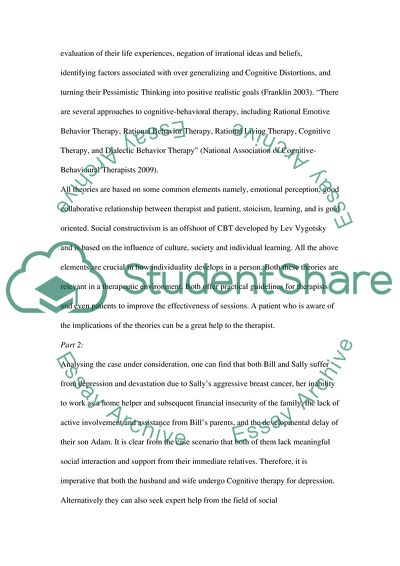
- Home
- Free Samples
- Premium Essays
- Editing Services
- Extra Tools
- Essay Writing Help
- About Us
- Studentshare
- Subjects
- Miscellaneous
- Social Policy
Social Policy - Essay Example

- Subject: Miscellaneous
- Type: Essay
- Level: Undergraduate
- Pages: 4 (1000 words)
- Downloads: 0
- Author: wintheiserzande
Extract of sample "Social Policy"
In the 1970s, psychologists have developed many cognitive interventions and theories of social constructionism to treat man’s depression and the effectiveness of such theories has long been proved. Cognitive- behavioural theory (there are several) stresses on perception of the individual rather than on circumstances or events. It implies that events and circumstances cannot be controlled by human beings. For example, people get sick, get divorced, win lotteries, face death and destruction, get married, get divorced etc.
The list of misfortunes and luck is endless. It is how one perceives a major event in life that matters. Review of literature shows that cognitive behavioural theories was first introduced by Jean Paget during the 1950s and developed by other theorists like Ellis, Beck, and Emery (Greene 2008, p.177). But later on the concept of clubbing cognitive and behavioural theories as an ideal form of social therapy came into prominence and was referred to as cognitive-behavioural therapy (CBT). “Broadly speaking, CBT incorporates cognitive, behavioural, and social learning perspectives and explains functioning as a product of reciprocal interactions between personal and environmental variables” (eds Lehmann and Coady 2001, p. 165). This involves meaningful self-evaluation, identification of skill deficits, evaluation of their life experiences, negation of irrational ideas and beliefs, identifying factors associated with over generalizing and Cognitive Distortions, and turning their Pessimistic Thinking into positive realistic goals (Franklin 2003).
“There are several approaches to cognitive-behavioral therapy, including Rational Emotive Behavior Therapy, Rational Behavior Therapy, Rational Living Therapy, Cognitive Therapy, and Dialectic Behavior Therapy” (National Association of Cognitive-Behavioural Therapists 2009). All theories are based on some common elements namely, emotional perception, good collaborative
...Download file to see next pages Read MoreCHECK THESE SAMPLES OF Social Policy
Social Policy Master
Introduction to Social Policy
British Social Policy
Social Policy Questions
Ai Media Social Policy
Introduction to social policy
Comparative Social Policy
Australian Social Policy

- TERMS & CONDITIONS
- PRIVACY POLICY
- COOKIES POLICY